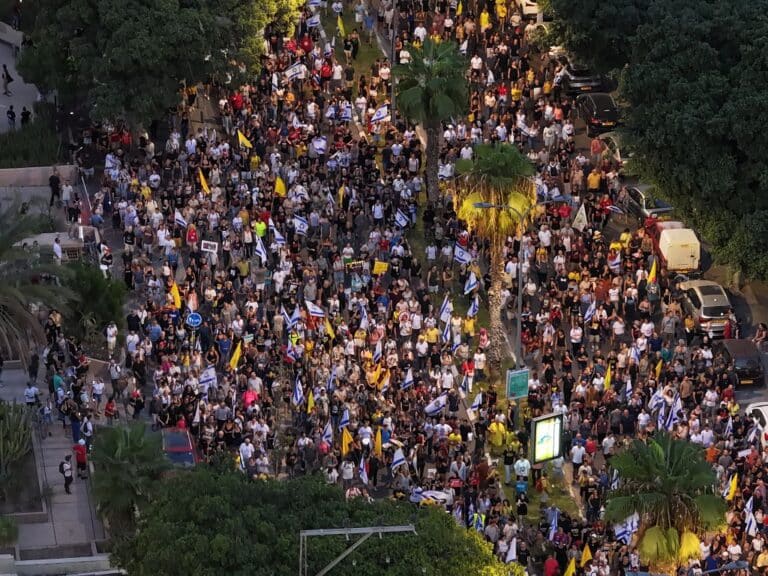
This week, Israel witnessed what was described as the largest demonstrations in its history. On Sunday night, an estimated 400,000 people flooded the streets of Tel Aviv. By the following morning, reports suggested that more than one million Israelis had participated in a nationwide strike.
The immediate spark was a press conference held in Tel Aviv by family members of the hostages still in Gaza. Standing together, they announced an “emergency break” in daily life until the hostages were released. The Hostage and Missing Families Forum, which represents a majority of the families, has remained firm in its message: the most reliable path to bringing their loved ones home is through a negotiated deal. Their reasoning is straightforward — nearly all of the hostages freed so far were released through agreements, not military operations.
But not all families share this view. The Tikvah Forum for the Families of Hostages, a smaller but vocal group, insists that military pressure is the only way to force Hamas to release captives. For them, negotiations risk emboldening the enemy.
Protests across Israel: national argument made visible
Regarding the protests themselves, one could simultaneously hear local popular protest chants blending with ancient Jewish songs — all unified by the sound of freedom. Videos circulated on social media, showing men and women weeping openly, as well as speeches given by former hostages and the families of those still held captive in Gaza by Hamas. Some speeches carried unmistakable political undertones, but most centered on humanitarian appeals.
Not everyone welcomed the demonstrations. The Tikvah Forum denounced them, arguing that protesters were putting the captives’ lives at risk in an effort to undermine the Israeli government. As is customary in our era, that division quickly spilled onto social media, where heated debates unfolded over who was marching, why they were marching, and whether any of it would make a difference.
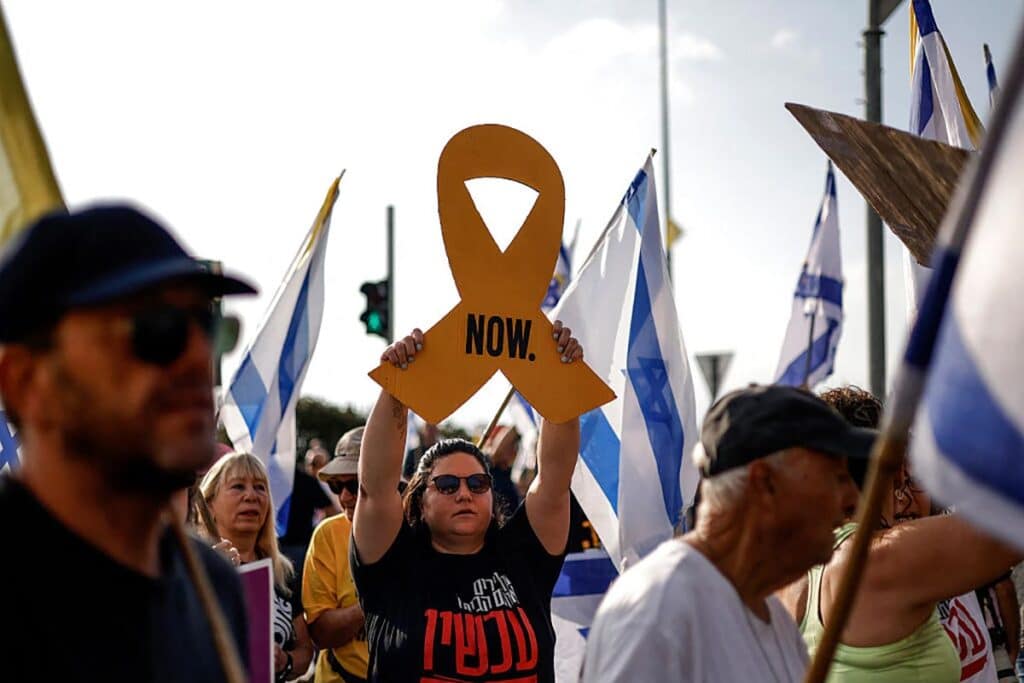
Like so much of Israeli public life, the protests were less a single, unified voice than a national argument made visible. They revealed both extraordinary solidarity and sharp fractures: between families of hostages, between citizens and government, and even between neighbors online.
With all this in mind, I set out to hear from fellow Israelis themselves: supporters, skeptics, those energized by the marches, and those alienated by them. The aim here is simple, and it is the title of this piece: “What Israelis want you to know about the protests.” It is against this backdrop that the protests must be read — not as a single voice but as a national argument made visible.
Can protests help release the hostages?
The first person I spoke with was Jewish activist Alana Zeitchik, whose family has been directly scarred by the war. Her cousin, Sharon Cunio, survived Hamas captivity along with her twin daughters, Emma and Yuli, who are now five years old. Sharon’s husband, David, however, remains in Hamas captivity. For Zeitchik, “the protest movement is my only hope these days,” it is “what gives my family, especially Sharon, the strength to keep going.”
Zeitchik emphasized the unifying force of the demonstrations: “What’s so powerful about the protest movement is the way it brings together people from across the political and ideological spectrum. It mobilizes society in service of one another. I think this may be the very essence of community—and it’s something American Jews could stand to learn from our brothers and sisters in Israel.”
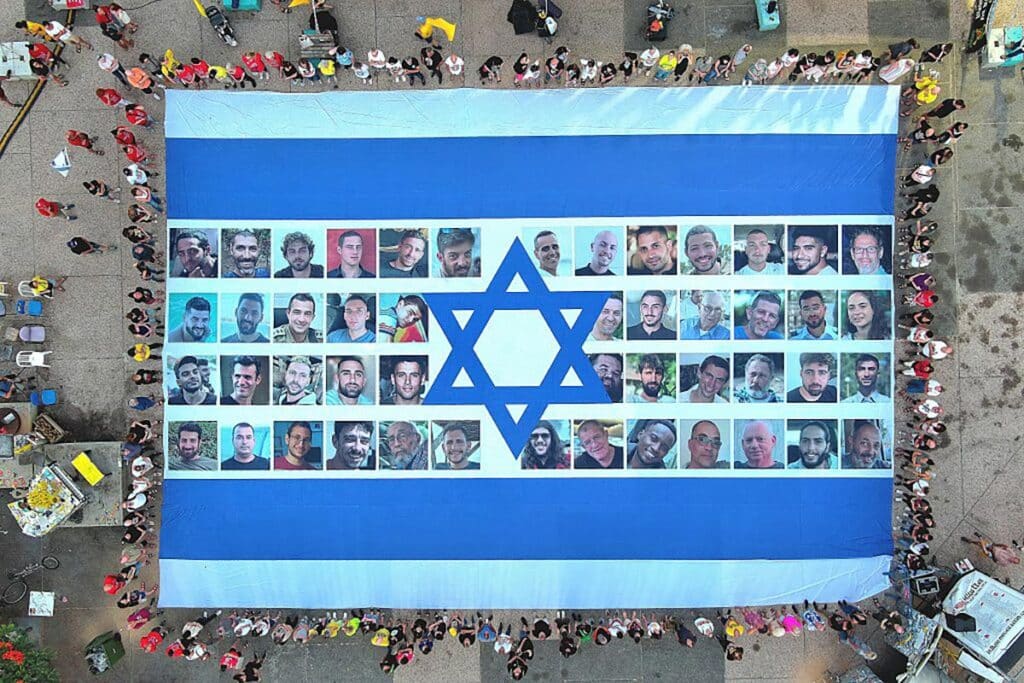
When asked about the accusation that the protests are “purely political,” she didn’t hesitate: “We don’t see the hostages as political. They are innocent human beings we love and care about. I think we can all agree on that. But political action is essential to bring them home. Many of the critics who accuse us of ‘being too political’ are, in fact, taking a political stance themselves through their vocal opposition to the protest movement. The only real difference between the critics and those in the streets is this: the protesters represent the political will of the majority of the people, while the critics often represent the political will of the government.”
Not everyone sees it that way. Adam Bellos, CEO of the Israel Innovation Fund, offered a sharply different perspective.
“The idea that protesting will change the situation rather than worsen it is ridiculous. The protesters act as if the Israeli government is the reason the hostages have not come home, creating a terrible image abroad — when in fact it is because of Hamas. If they think we are going to lay down our arms or change course just to bring the hostages home, that is absurd. It spits in the face of the sacrifices that thousands of families have made, with their children who are soldiers, many of whom have died in this war.”
When pressed about the hostages themselves, Bellos added, “Everyone wants the hostages home. But what matters most is maintaining a realistic approach.”
Shanie Reichman of the Israel Policy Forum argued nearly the opposite.
“People who say the demonstrations don’t advance a deal are assuming the Israeli government is doing everything in its power to reach one, regardless of public pressure. We know that’s not true.”
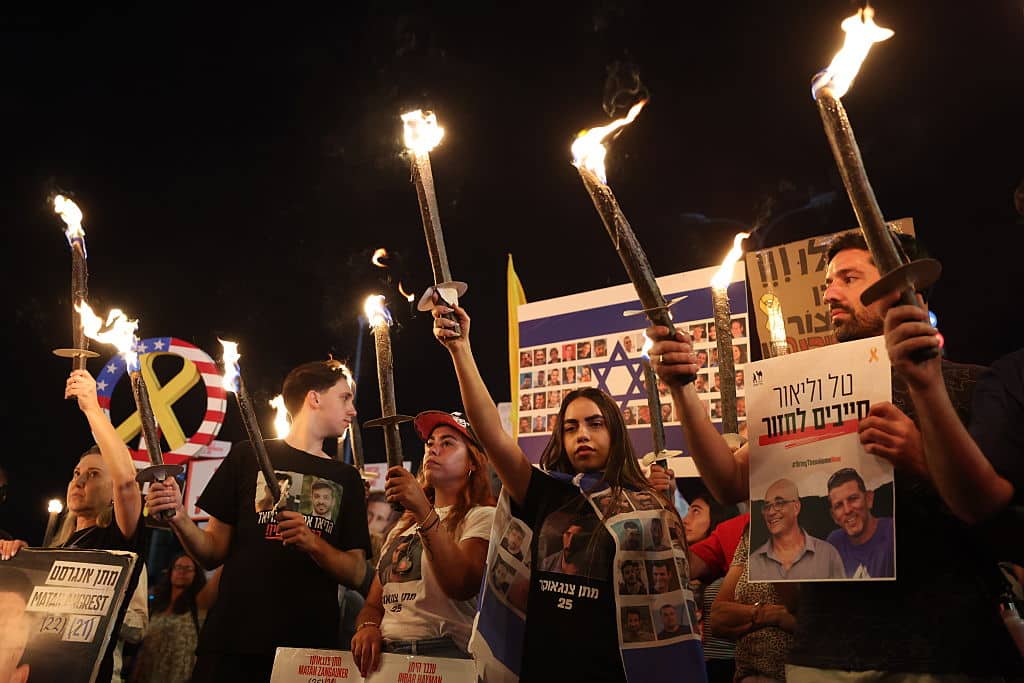
She pointed to delays in government action, saying that “in this war, it took the government six weeks just to bring the first hostage deal to the cabinet. That delay forced women and children to suffer unnecessarily. This is why we protest.”
Cutting the arguments straight down the middle, as he so often does, was Professor Gil Troy, a historian whose son is serving as a reservist in the Israeli army. Troy has long been known for cutting through partisan divides, often urging Israelis and diaspora Jews alike to embrace nuance over certainty. Unlike activists on either side of the debate, he doesn’t claim to have the solution — and that, he argues, is precisely the point.
“Since October 7, Israel has faced a series of impossible choices, especially regarding the hostages,” Troy said. “The only thing I am sure about is that I am unsure what to do — and people who are so sure they know what to do scare me. I do, however, think all these protests and all this money should have been directed against Qatar and other Hamas enablers abroad.”
A nation arguing with itself
Sara Yael Hirschhorn, a lecturer at Haifa University, described the demonstrations as “absolutely unprecedented.” She stressed that the protests were “held for a deeply felt humanitarian cause.”
Yet despite this “dramatic event” and the scale of the protests, Hirschhorn stressed that when she woke up on Monday morning, “it felt as if very little had changed.”
For Hirschhorn, the key question remains “how to translate protest into policy?” She noted that it’s still not clear whether the Israeli government has the leverage to exert the pressure on Hamas ultimately needed to free the hostages, warning that time is running out. In her view, “the Netanyahu administration’s idea to expand the war will not lead to a dramatic rescue mission to bring the hostages back to their homeland.”
Alex Lederman of the Israel Policy Forum attended the protests. He put into words the very questions many Israelis are wrestling with: “What price should the state be willing to pay to save its citizens taken hostage? How do you negotiate with terrorists without legitimizing and emboldening them?”
His own conclusion was stark: “Israelis are not naïve about the costs of a hostage deal, but also have no illusions about whom the war’s continuation is ultimately serving.” By this, he pointed directly to Prime Minister Benjamin Netanyahu. In Lederman’s view, Netanyahu’s approach is shaped less by national interest than by political survival. Facing corruption trials, collapsing approval ratings, and a fragile coalition, Netanyahu is seen by many as prolonging the war to delay elections and preserve his hold on power.
“Netanyahu’s approach is shaped by selfish political considerations, rather than a thoughtful calibration of what is in the interest of the country,” Lederman said.
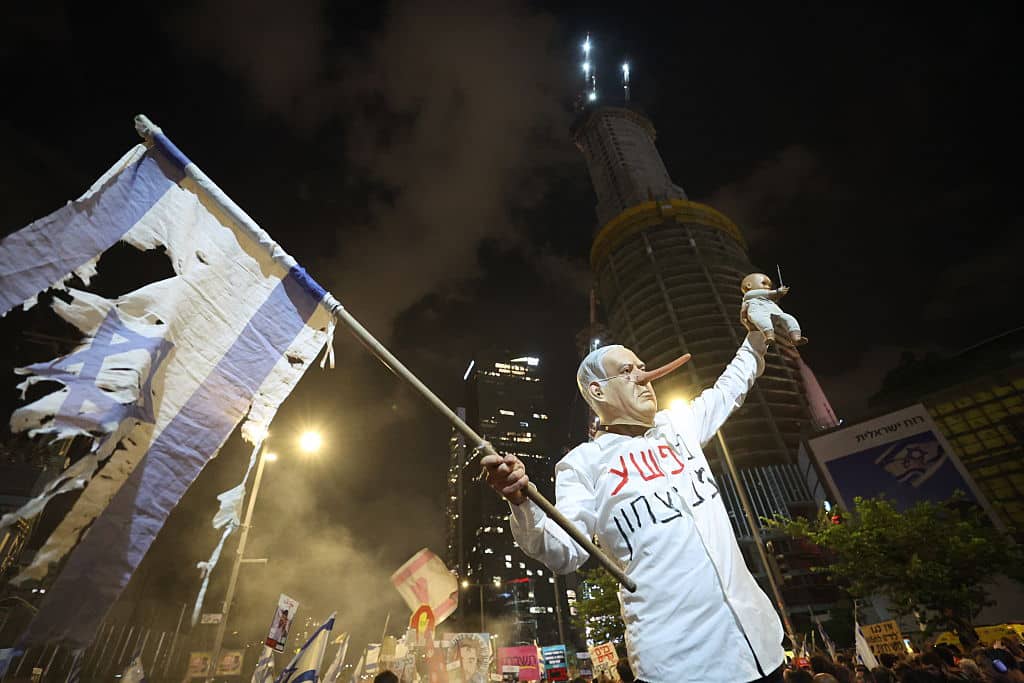
Katharina Hoeftmann, a German-Israeli author, expressed that “the protests were an absolute beacon of hope. We have such a powerful civil society, courageous and opinionated, that any other nation can only dream of. One million people on the street after almost two years of war and exhaustion—that’s deeply touching and impressive.”
But others were far more skeptical. Israeli researcher Jude Taragin believes we have reached the point “where the government doesn’t really care about the protests, which is tragic.”
Meanwhile, popular Israeli influencer Margot Touitou offered perhaps the most emotional defense of the demonstrations.
“I didn’t make Aliyah to sit on the sidelines in silence. As a proud Olah and a proud Israeli, I’m honored to be one of the millions who showed up for our brothers and sisters. Because I know they’d do the same for me. That’s not weakness. That’s love. That’s what it means to be Israeli,” she said.
Drawing on Jewish tradition, she rejected the notion that protest signals division or weakness: “Let’s put to rest the idea that protest makes us look weak, divided, or somehow fuels our enemies. If anything, it shows we are acting in accordance with a long, proud history of Jewish rebellion….If that legacy runs through our veins, why would we stop now? Silence was never our tradition. Resistance is. This is who we’ve always been.”
And so, the protests remain suspended between ecstasy and futility — an eruption of civic spirit and grief that may or may not alter the course of events. They are proof that Israel is not a silent country, nor a passive one, but a nation forever arguing with itself.
In the end, the streets of Tel Aviv and beyond became something more than a demand for a deal; they became a mirror of Israel’s soul, fractured yet unbroken, uncertain yet defiant — an argument turned into a spectacle of freedom, in a land where arguments have always been the measure of life itself.
